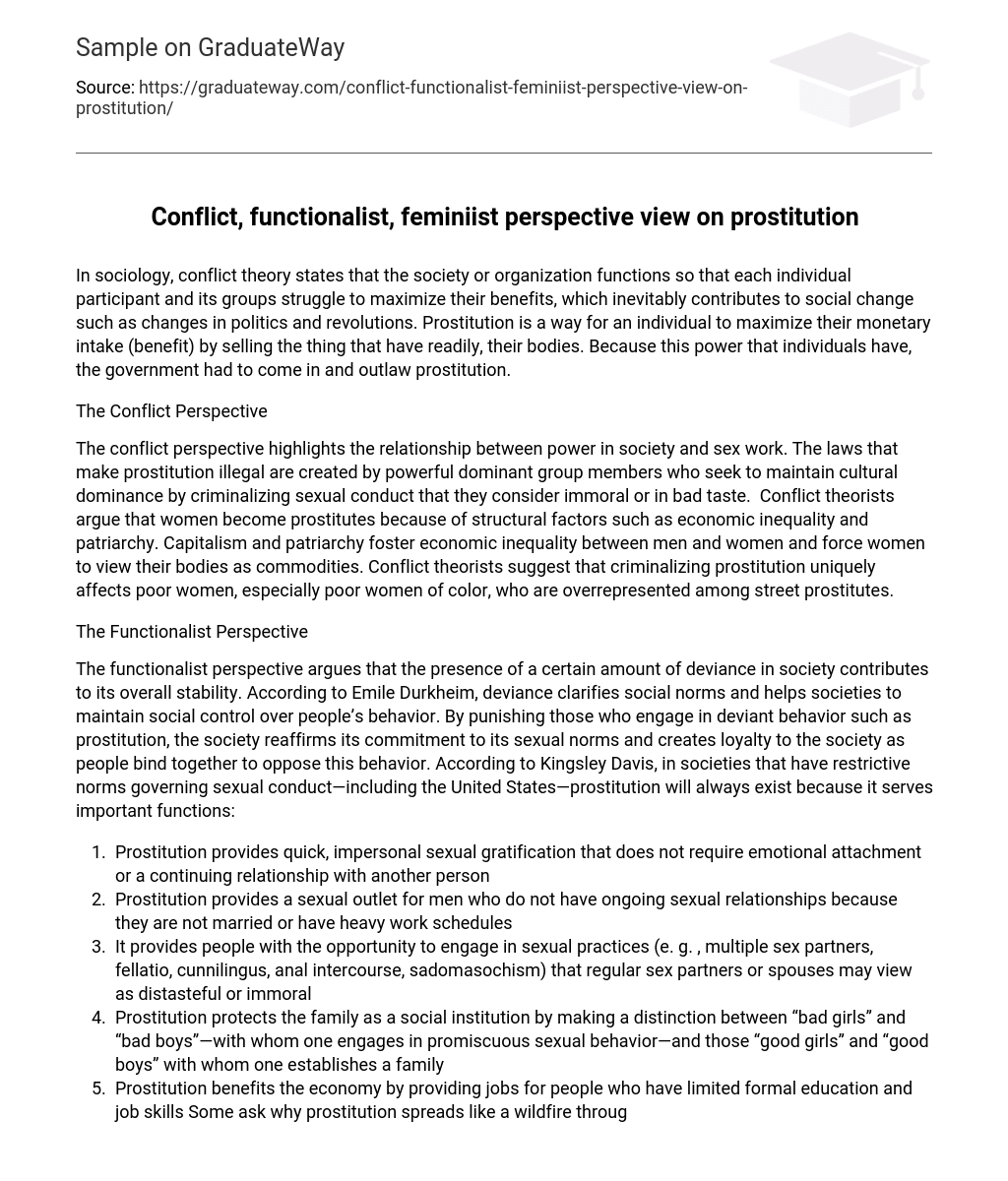Conflict theory in sociology argues that society and organizations operate in a manner where individuals and their groups strive to maximize their benefits, leading to social change such as political shifts and revolutions. Prostitution arises as a means for individuals to maximize their financial gains by selling their own bodies, given the readily available resource. Consequently, the government intervened and made prostitution illegal due to the power wielded by these individuals.
The Conflict Perspective
The conflict perspective emphasizes the connection between power within society and sex work. Powerful members of the dominant group create laws that criminalize prostitution in order to preserve cultural dominance by deeming certain sexual conduct immoral or distasteful. Conflict theorists contend that women engage in prostitution due to structural influences like economic inequality and patriarchy. Capitalism and patriarchy contribute to economic disparities between genders, compelling women to perceive their bodies as commodities. Conflict theorists propose that the criminalization of prostitution disproportionately impacts impoverished women, particularly women of color, who are excessively represented among street prostitutes.
The Functionalist Perspective
The functionalist perspective maintains that the level of deviance present in society plays a role in maintaining stability. Emile Durkheim argues that deviance serves to clarify social norms and enforce social control. By punishing individuals who engage in deviant behavior like prostitution, society reaffirms its adherence to sexual norms and fosters loyalty as members band together to oppose this behavior. Similarly, Kingsley Davis posits that in societies with strict regulations on sexual conduct, such as the United States, prostitution will always exist due to its important functions.
- Prostitution provides quick, impersonal sexual gratification that does not require emotional attachment or a continuing relationship with another person
- Prostitution provides a sexual outlet for men who do not have ongoing sexual relationships because they are not married or have heavy work schedules
- It provides people with the opportunity to engage in sexual practices (e. g. , multiple sex partners, fellatio, cunnilingus, anal intercourse, sadomasochism) that regular sex partners or spouses may view as distasteful or immoral
- Prostitution protects the family as a social institution by making a distinction between “bad girls” and “bad boys”—with whom one engages in promiscuous sexual behavior—and those “good girls” and “good boys” with whom one establishes a family
- Prostitution benefits the economy by providing jobs for people who have limited formal education and job skills Some ask why prostitution spreads like a wildfire through our cities and streets. This is an easy question for functionalists, prostitution flourishes because it satisfies sexual needs that are not able to be met elsewhere(Henslin 51).
Prostitutes serve as a release for sexually frustrated men, offering them a sexual outlet when they struggle to find a partner. According to functionalist Kingsley Davis, prostitutes cater to men who face challenges in establishing sexual relationships, struggle to find long-term partners, have experienced a failed relationship, crave immoral sexual gratification, seek sexual pleasure without attachment, are curious about new experiences, or are dissatisfied with their marital sex life. By fulfilling these needs, prostitution acts as a means of social control over sexual behavior. This is advantageous because it redirects men with sexual desires away from unwilling partners, towards willing partners who require payment.
Prostitution undoubtedly helps reduce the occurrence of rape and sexual assault in society. However, it also attracts low-quality prostitutes who degrade cities and societies. The functionalist theory provides the best sociological perspective on prostitution. According to functionalists, prostitution serves as a method of controlling and directing sexual behaviors. Prostitutes fulfill the needs of men who may not have constant access to women. Additionally, it fulfills men’s needs by offering a cheap, emotionless, and temporary relationship.
By examining prostitution, we can observe its continuous existence due to its fulfillment of social purposes. This involves addressing the needs of individuals who are experiencing sexual frustration. Prostitutes assist in alleviating pressures that might otherwise burden individuals who are not willing to engage in such activities. If it wasn’t for the assistance provided by prostitutes in satisfying the unsatisfied, other social problems like rape, sexual assault, and kidnapping could potentially escalate into more significant issues. Functionalism allows for the recognition of each role that prostitution plays within society.





